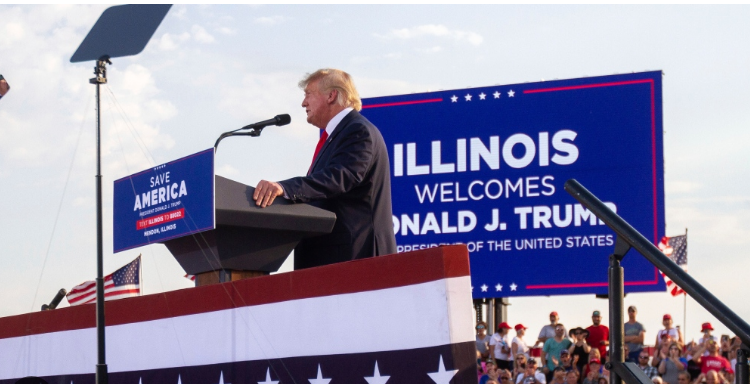The upcoming March primary ballot in Illinois has become the center of controversy as election officials grapple with the recommendation to remove Donald Trump’s name from the list of candidates. This move has stirred up debates and legal considerations, bringing attention to the broader issue of political eligibility and the aftermath of the January 6 insurrection.
Retired Judge’s Recommendation: A Shift in Decision-Making Authority
At the heart of the matter is the recommendation from retired Kankakee judge, Clark Erickson. Once a member of the Republican party, Erickson is now a hearing officer for the Trump case. Instead of leaving the decision solely to the Election Board, he suggests that the state’s courts should weigh in on Trump’s eligibility for the 2024 ballot.
During a hearing on Friday, Erickson heard arguments from voters who contend that Trump should be removed from the Illinois ballot. Their central claim revolves around the belief that the evidence points to Trump’s active participation in the insurrection that unfolded on January 6. This raises questions about whether a candidate with such a controversial background should be allowed to run for public office.
In a surprising turn of events, Erickson agreed with the arguments put forth by those advocating for Trump’s removal. The retired judge acknowledged that the evidence presented during the hearing suggested Trump’s involvement in the insurrection. This agreement adds weight to the calls for reconsideration of Trump’s eligibility, creating a complex situation for the Election Board to navigate.
While Erickson sided with those seeking Trump’s removal, his statement that “the state board lacks th” raises questions about the limitations or deficiencies he perceives within the Election Board. Unfortunately, the provided information does not elaborate on what specific aspects the board might be lacking. This ambiguity leaves room for speculation and underscores the intricacies of the decision-making process.
Erickson’s recommendation to involve the state courts in the decision introduces a new layer of complexity. It suggests that the legal system should play a pivotal role in determining Trump’s eligibility, emphasizing the gravity of the situation. The courts, known for their impartiality, could provide a more comprehensive evaluation of the evidence and legal arguments, potentially influencing the outcome.
As the Election Board contemplates the path forward, the controversy surrounding Trump’s eligibility becomes a divisive issue among Illinois voters. Those in favor of Trump’s removal argue for accountability and the need to distance the electoral process from individuals associated with actions deemed insurrectionary. On the other hand, Trump supporters may view this as a politically motivated attempt to sideline a prominent figure within the Republican party.
Read More:
- Trump Holds First Campaign Event Since Jury Ordered Him to Pay $83.3 Million to E. Jean Carroll
- Colorado voters who want Trump barred from state primary ballot urge SCOTUS to rule on case
- Joe Biden wins NH through write-in process
The recommendation to remove Donald Trump’s name from the March primary ballot in Illinois places the Election Board in a challenging position. The involvement of the state courts adds a legal dimension to the decision-making process, leaving room for a thorough examination of the evidence and legal arguments. As the controversy unfolds, it underscores the delicate balance between political eligibility, legal considerations, and the potential impact on the electoral landscape in Illinois. The ultimate decision will not only shape the 2024 ballot but also set a precedent for how states handle the eligibility of candidates with contentious backgrounds.

